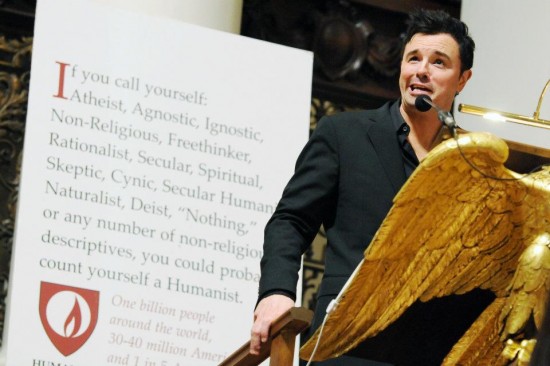
Awhile back, Hemant Mehta put up a brief blog post congratulating Seth MacFarlane for being named the 2011 Harvard Humanist of the Year. Predictably enough, MacFarlane was savaged in the comments section by the emergent left-wing callout culture, who raked him over the coals as pretty much every sort of -ist and -phobe you can imagine, primarily because of the television shows that he helps to produce. Watching the Academy Awards on Sunday night, I braced myself for yet another round of humorless anti-comedic criticism.
Probably the best takedown piece I’ve read so far stated that MacFarlane’s humor “relied less on its own patently sexist, racist, homophobic, etc. content than on admiration for or disgust with the host’s willingness to deliver it.” Since I’m somewhat unsure about the etcetera here, I’m just going to have a look at the big three: homophobia, racism, and sexism. Were these traits patently on display, and if so, to what end?
Homophobia
Spencer Kornhaber refers to MacFarlane’s “insistence to Shatner that he wasn’t a member of the gay men’s chorus he’d just sang with” as the very “definition-of-homophobic.” What Mr. Kornhaber fails to notice is that MacFarlane himself is the butt of that joke, firstly for feeling the need to point out that he isn’t gay, and then again with Mr. Shatner’s subsequent insistence that he really is gay, “Trust me…you join the chorus.” Homophobia is worth laughing at, and sometimes we need someone to channel it so we can have a laugh at their expense. (Incidentally, if you are interested in reading about MacFarlane’s actual views on gays and gay rights, when he isn’t pretending to be in conversation with the bridge of the U.S.S. Enterprise, probably you should read this interview from The Advocate.)
Racism
Kornhaber cites to MacFarlane “pretending to mix up Denzel Washington and Eddie Murphy” as one of his patently racist moments, and I have to admit that I would have grave doubts about anyone who really had trouble telling these men apart. Once again, though, we have to ask ourselves who is really the butt of the joke here, and once again, it turns out to be Seth himself. He is pretending to be suffer from a sort of racist prosopagnosia which tends to afflict only those who see other people primarily in terms of their ethnic background. Racism is worth laughing at, and sometimes we need someone to channel it so we can have a laugh at their expense. (If you’d like to see what that looks like in the extreme, check out this incredibly discomfiting old clip of Dustin Hoffman portraying comic genius Lenny Bruce. Or just kick back with most any episode of All In the Family.)
Sexism
Finally, we come to sexism, and in this case it is somewhat harder to be charitable to MacFarlane, because there are so many jokes about women laced throughout the show. I watched “We Saw Your Boobs” at least three times through, and I still can’t figure out if that bit is merely being juvenile, if it’s making fun of hetero men for their obsession with breasts, or if it’s taking the piss out of the Academy for being so damn stogy all of the time. I suppose it could be any or all of the above, but I would never have supposed that the humor is somehow founded on the ridiculous notion that the “nudity of female actresses exists primarily for the sexual enjoyment of men” as Greta Christina has claimed. If anything, the butt of the joke in this case are boorish men who fail to see the role of nudity in mainstream cinema is to further a larger artistic purpose rather than appeal to their own prurient interests. Once again, it seems to me that MacFarlane is making himself the butt of the joke, and because sexism is worth laughing at, we may need someone to channel it so we can have a laugh at their expense.
Now perhaps I am being too charitable, and maybe I have failed to recognize those cases in which MacFarlane’s humor tends to perpetuate rather than undermine pernicious stereotypes. When it comes to my allies and fellow humanists, however, I’m duty bound to consider the possibility of a charitable interpretation whenever one exists, and I’m not about to assume that every controversial joke should be taken in the worst possible way.
ETA: A far stronger argument against the opening song was made on Salon. It relies at most points on the unstated premise that the pain experienced by fictional characters should inflect our feelings about the actresses portraying them. At one point, however, the argument is entirely unassailable.
